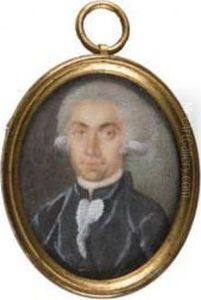Jean Baptiste Weyler Paintings
Jean Baptiste Weyler was an 18th-century artist, born in 1747 in Antwerp, which was then part of the Austrian Netherlands. He is known for his work as a painter, particularly in the realm of portraiture and still life. Weyler's training and early career developed in an era when European art was characterized by a mix of late Baroque and Rococo styles, transitioning towards Neoclassicism.
Weyler's upbringing and education in the arts remain somewhat obscure, but it is likely that he was involved in the vibrant artistic community of Antwerp. This city had a rich artistic heritage, being the home of earlier masters such as Peter Paul Rubens. During his career, Weyler would have been exposed to the works of his predecessors, which could have influenced his style and technique.
His oeuvre includes elegant and refined portraits, which often captured the sophistication of the European elite. Additionally, his still life paintings are noted for their detail and the skillful depiction of textures and surfaces. Weyler's work reflects the aesthetics of his time, where emphasis on grace, ornamentation, and a lightness of touch were highly valued.
Jean Baptiste Weyler's career unfolded during a period of significant political and social changes in Europe, including the lead-up to the French Revolution. Despite these tumultuous times, he managed to create works that offered a sense of calm and permanence, a testament to the escapism that art can provide even in periods of upheaval.
Unfortunately, Weyler did not enjoy a long life, passing away relatively young in 1791. The exact circumstances of his death are not widely documented, but his death marked the loss of a talented artist during a transformative period in European art. Weyler's contributions to portraiture and still life have been appreciated by art historians, though he may not enjoy the same level of recognition as some of his contemporaries. His works today are valuable for their representation of 18th-century aesthetics and their place within the artistic developments of the time.


